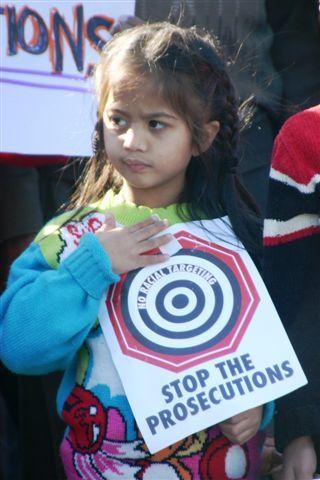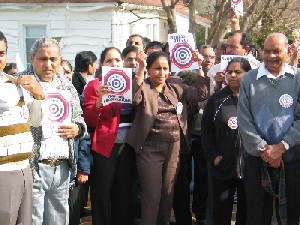Feature:
ACLU
Seeks
Dismissal
of
"Operation
Meth
Merchant"
Cases
for
Racial
Bias
4/14/06
The American Civil Liberties Union Drug Law Reform Project moved last week to have charges dismissed against a group of South Asian convenience store owners and operators arrested in northwest Georgia in a controversial investigation called Operation Meth Merchant. That operation ostensibly aimed at stopping convenience stores from selling legal household products that can be used to manufacture methamphetamine, but the ACLU is making a strong case that it was racially biased. Forty-nine people were charged with criminal offenses in Meth Merchant and 44 of them are of South Asian descent. While more than 80% of area convenience stores are owned by whites or other ethnic groups, 23 of the 24 stores targeted by the investigation are owned by South Asians. Meth Merchant targeted almost 20% of South Asian-owned stores, but less than 0.2% of stores owned by whites or other ethnic groups, the ACLU charged in its April 5 motion to dismiss the remaining charges because of racially selective prosecution. That means South Asian stores were 100 times more likely to be targeted than other stores, the ACLU pointed out.
Meth Merchant, a joint operation of the DEA and state and local police, sent informants into the stores seeking to buy items such as cold medicine, cooking fuel, and matchbooks, all of which are legal products. The informants would mention that they needed "to cook," which, according to authorities, was sufficient to indicate the South Asian clerks, many with limited English-language proficiency and none familiar with meth manufacturing slang, knew they were selling items to be used in cooking the popular stimulant. In its motion to dismiss the charges, the ACLU argued that the operation targeted South Asian stores, citing statements from the informants themselves. "They only sent me to Indian stores... they wanted me to say things like 'I need it to go cook' or 'Hurry up, I've got to get home and finish a cook,'" said an undercover informant in a sworn statement attached to the ACLU's legal papers. "The officers told me that the Indians' English wasn't good, and they wouldn't say a lot so it was important for me to make these kinds of statements." The ACLU also presented evidence that police ignored numerous tips pointing toward at least 16 white-owned stores in the area. Meth makers arrested by police routinely identified this group of local stores as supply sources, yet police took no action. In fact, according to another witness statement cited in the motion, law enforcement officials even alerted one white store owner to the investigation and told him how to avoid trouble by removing particular items from the shelves. The differential treatment of white and South Asian store operators in Meth Merchant and the targeting of South Asian stores without any evidence against them violates the 14th Amendment's Equal Protection Clause, the ACLU argued in the dismissal motion. That clause protects people from being selectively targeted by law enforcement based on their race and/or ethnicity. US Attorney David Nahmias was unmoved. "With regard to the issue of alleged selective prosecution," he told the Associated Press, "several defendants raised such a claim before the deadline passed for filing pretrial motions. The selective prosecution motions have all been denied by the magistrate judge in a ruling affirmed by the District Court. We will reply to any additional motions in court." But while Nahmias remained steadfast in his effort to continue to prosecute the remaining cases -- 23 people and 10 corporations have already pleaded guilty and eight cases have been dismissed -- he is facing political as well as legal challenges. The targeted merchants and their supporters have formed the Racial Justice Campaign Against Operation Meth Merchant to end the racially biased prosecutions and build lasting alliances between immigrant communities and people of color in Northwest Georgia. The group has held protest demonstrations, urged Nahmias to end the persecution, and generally attempted to drum up support for the store owners and clerks.
"Northwest Georgia is made no safer by police targeting a particular racial group while giving a free pass to those they have good reason to believe are actually making and selling meth," said campaign organizer Deepali Gokhale in a statement responding to the filing of the motion. "Families have been torn apart and lives have been destroyed by this racist investigation, and they aren't the only victims here. We all lose when law enforcement adopts irrational approaches that waste taxpayer money, undermine the public's trust, and leave us less safe in the process." "Scapegoating a community based on their race will never make northwest Georgia safer," said Priyanka Sinha from Raksha, an Atlanta-based organization serving the South Asian community. "Law enforcement has a responsibility to investigate people based on evidence, not skin color. These people are human beings. They are hard-working and long standing members of the Georgia community. Because of these racially targeted and irresponsible prosecutions, their lives are ruined." "We are fighting together, we are not alone, we knew we were treated unfairly and now here is the proof. Because we have come together ourselves, others are also coming forward to tell the truth and demand that the government treat us fairly," said Gita Patel, wife of one of the South Asian store owners arrested in the sting operation. The ACLU is representing three defendants in the cases in the US District Court for the Northern District of Georgia. Those trials are set for May 1, unless the ACLU prevails in its motion.
|


